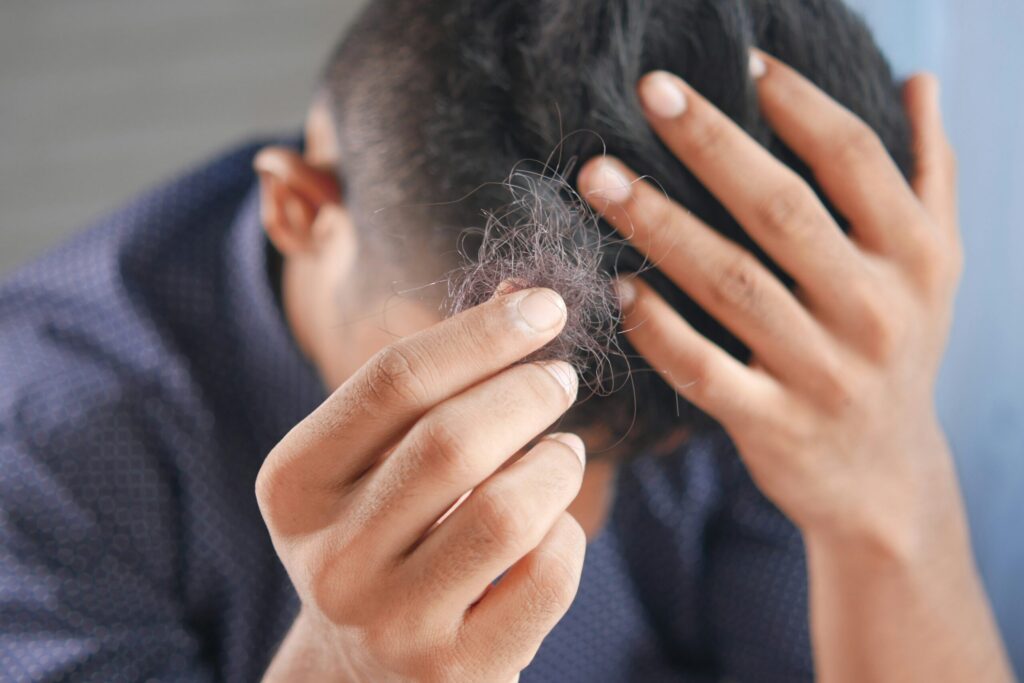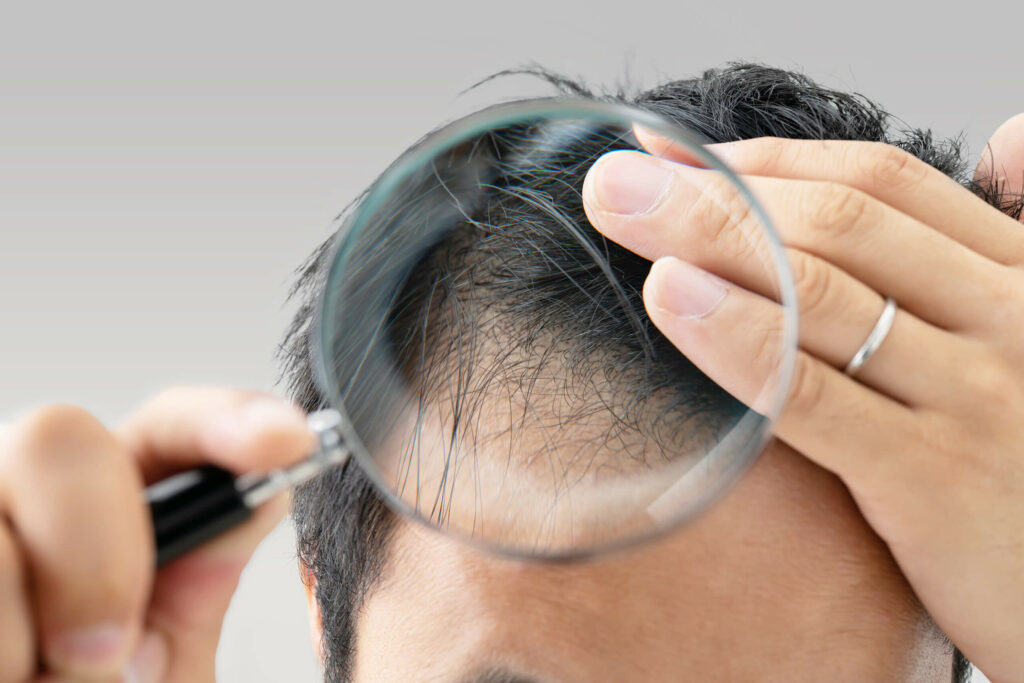Are you noticing sudden hair thinning or shedding and wondering if stress could be the cause? You’re not alone. Stress Hair Loss in Men is more common than most realize and can result from both emotional and physical strain.
This guide explains why it happens, what signs to look for, and how you can treat and prevent it. You’ll learn the difference between temporary and long-term hair loss, backed by expert advice and proven solutions.
Whether you’re experiencing this now or want to protect your hair, this article offers medically accurate, trustworthy insights to help you take control.
Stress Hair Loss in Men?
Stress-related hair loss refers to hair shedding or thinning triggered by physical or emotional stress. In men, this condition often presents as sudden, noticeable hair fall, sometimes leading to visible scalp patches.

There are three main types of stress-induced hair loss:
- Telogen Effluvium: Hair prematurely enters the resting (telogen) phase, causing excessive daily shedding.
- Alopecia Areata: An autoimmune condition where stress may trigger the immune system to attack hair follicles.
- Trichotillomania: A psychological disorder where individuals compulsively pull out their own hair due to stress or anxiety.
Causes: How Stress Triggers Hair Loss in Men
Stress can affect the hair growth cycle in multiple ways. Common causes include:
1. Emotional Stress
Major life changes, anxiety, or depression can disrupt the natural hair cycle.
2. Physical Stress
Events like surgery, illness, rapid weight loss, or intense exercise can shock the system and trigger shedding.
3. Hormonal Disruption
Stress elevates cortisol, a hormone that disrupts the normal balance needed for hair growth.
4. Lifestyle Factors
Poor sleep, alcohol, smoking, and inadequate nutrition — all linked to stress — can weaken hair health.
Signs and Symptoms of Stress-Related Hair Loss in Males
Recognizing stress-induced hair loss early improves the chance of successful treatment. Look for:
- Noticeable hair fall during showers or brushing
- Thinning across the scalp rather than distinct bald spots
- Hair clumps on pillows or clothing
- Slowed regrowth
- Increased shedding 1–3 months after a stressful event
Pro Tip:
Unlike genetic hair loss (which often follows a receding pattern), stress hair loss in males tends to be more diffuse and temporary.
Is Hair Loss from Stress Permanent or Temporary?
In most cases, stress-related hair loss is reversible, especially Telogen Effluvium. However, it depends on:
| Type | Reversible? | Recovery Time |
|---|---|---|
| Telogen Effluvium | ✅ Yes | 3–6 months |
| Alopecia Areata | ⚠️ Sometimes | Varies; may require medical treatment |
| Trichotillomania | ❌ Needs behavioral therapy | Depends on severity |
Expert Insight:
According to Dr. Rana Irfan (ABHRS, ISHRS), “Early diagnosis and reducing stress triggers are key to restoring healthy hair cycles in men.”
Best Treatments for Stress Hair Loss in Men
Here’s a breakdown of treatment options based on severity and type:
1. Stress Management
- Mindfulness or meditation
- Regular sleep and exercise
- Therapy or counseling for emotional stress
2. Nutrition and Supplements
- Biotin, iron, vitamin D, and zinc can support regrowth
- Protein-rich diet helps build keratin (hair’s primary protein)
[Link to: Hair Loss Blood Tests in Islamabad]
3. Medications
- Minoxidil (topical): Promotes growth during regrowth phase
- Corticosteroids: For alopecia areata under a doctor’s supervision
- Antidepressants: For underlying stress or anxiety (if prescribed)
4. Clinical Treatments
- PRP Therapy: Injects platelet-rich plasma to stimulate follicles
- Low-Level Laser Therapy (LLLT): Boosts cellular repair
- Microneedling: Enhances topical absorption and regrowth
Can Hair Grow Back After Stress?
Yes. Most men can regrow hair after stress if the root cause is addressed early. Recovery may take a few months, and some cases benefit from medical interventions.
Recovery Timeline:
| Week | What to Expect |
|---|---|
| 0–4 | Continued shedding possible |
| 4–12 | Shedding slows; regrowth starts |
| 12–24 | Noticeable volume returns |

Expert Tips to Prevent Hair Loss from Stress
- Maintain a consistent sleep schedule (7–8 hours)
- Avoid crash diets or rapid weight loss
- Exercise moderately to lower cortisol
- Use gentle shampoos and avoid excessive styling
- Seek therapy or coaching for chronic stress
Quick Checklist:
✅ Hydrate
✅ Balanced Diet
✅ Scalp Massage
✅ Reduce caffeine/alcohol
✅ Seek professional support if needed
When to See a Specialist
Consult a hair specialist if:
- Hair loss persists beyond 3 months
- You notice bald patches or scalp irritation
- There’s a family history of autoimmune conditions
- Hair isn’t regrowing despite stress reduction
Frequently Asked Questions (FAQs)
❓ Can stress really cause hair loss in men?
Yes, stress can disrupt the hair growth cycle and cause conditions like Telogen Effluvium or Alopecia Areata.
❓ How do I know if stress is causing my hair loss?
Look for recent stressful events, diffuse thinning, and sudden shedding within 1–3 months.
❓ Will hair grow back after stress-related hair loss?
In most cases, yes—especially if the stressor is managed and proper care is taken.
❓ What’s the fastest way to stop stress-related hair loss?
Combine stress management, proper nutrition, and early treatment like PRP or Minoxidil.
❓ Is stress hair loss the same as male pattern baldness?
No. Male pattern baldness is genetic and usually permanent, while stress hair loss is often temporary and diffuse.
Regain Confidence & Hair Health
Don’t let stress control your hair or confidence. If you’re dealing with unexplained shedding or hair thinning, it’s time to act. Book a consultation with Dr. Rana Irfan (ABHRS, ISHRS) in Islamabad to get expert diagnosis and start your recovery journey today.
